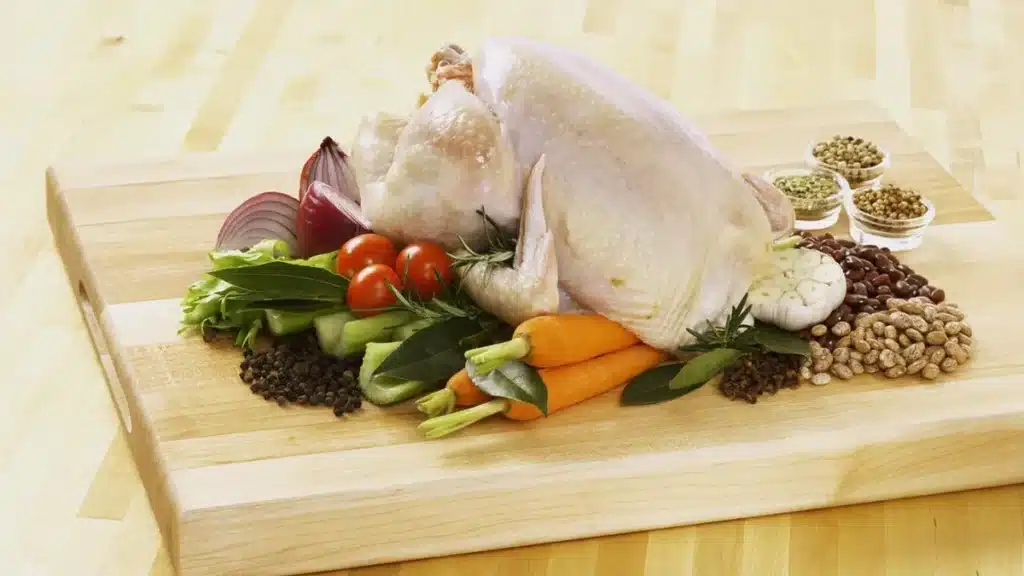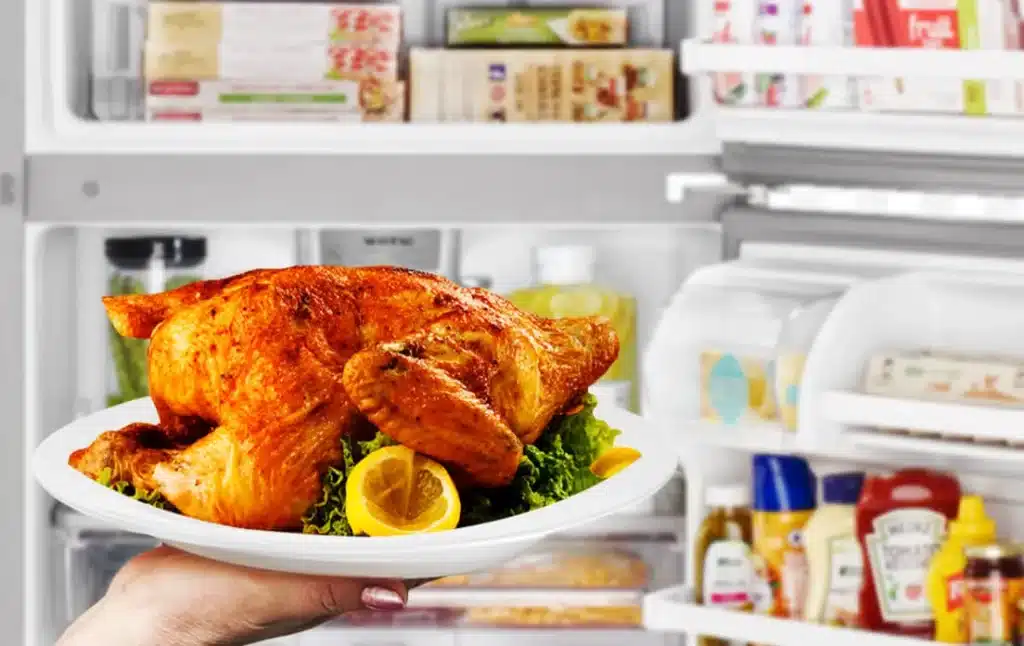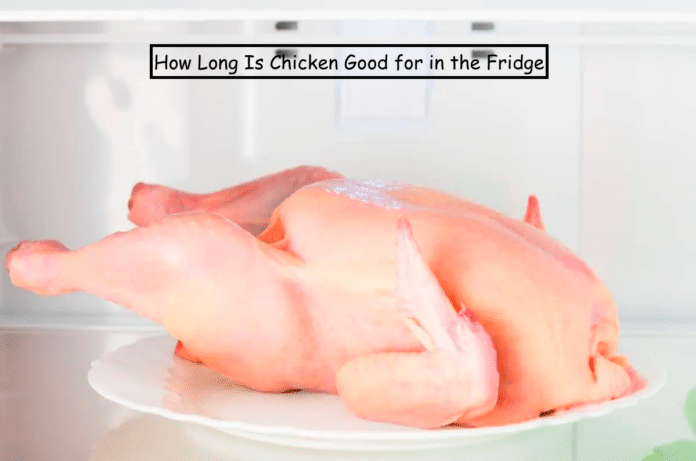Are you wondering how long is chicken good for in the fridge? Knowing the answer to this question is important to ensure food safety and avoid wasting food. Chicken is a popular protein source but can be tricky to store and handle properly.
In this article, we’ll explore the shelf life of a raw and cooked chicken in the fridge and related questions such as how long thawed chicken can last and how to tell if the chicken has gone bad. So, if you want to learn how to keep your chicken fresh and delicious for as long as possible, keep reading!

Related: How Many Ounces in a Cup (Food Measurements)
How Long Is Raw Chicken Good for in the Fridge?
Raw chicken refers to any uncooked chicken that has not been heated to a safe temperature to kill harmful bacteria. Proper storage of raw chicken in the fridge is essential to prevent the growth of bacteria that can cause foodborne illness.
Raw chicken should be stored in its original packaging or in a covered container on the fridge’s bottom shelf, where it’s coldest.
The average shelf life of a raw chicken in the fridge is around 1-2 days, but this can vary depending on factors such as the fridge’s temperature and the chicken’s age at the time of purchase.
Related questions, such as whether raw chicken can last for 3, 5, or 7 days in the fridge, are often asked, but it’s best to err on the side of caution and use raw chicken within 1-2 days to ensure food safety.
There are a few things to look for to tell if a raw chicken has gone bad. Fresh raw chicken should have a pinkish colour and smell fresh. If it has a sour or ammonia-like smell, or if the colour has changed to grey or yellow, it may be spoiled and should not be consumed. Additionally, if the texture feels slimy or tacky, this is another indication that the chicken has gone bad and should be discarded.
READ ALSO:
How Long Is Cooked Chicken Good for in the Fridge?
A cooked chicken’s shelf life differs from a raw chicken due to the cooking process. When cooked, chicken kills off the most harmful bacteria that can cause foodborne illness, making it safer to eat. However, cooked chicken can still go bad if not stored properly.
The average shelf life of a cooked chicken in the fridge is around 3-4 days. However, like raw chicken, the shelf life of cooked chicken can vary depending on various factors such as temperature, how it was stored, and how it was cooked. Consuming cooked chicken in the fridge for longer than 4 days is generally not recommended, as eating it may be unsafe.
Some may wonder if a cooked chicken can last 5 or 7 days in the fridge. While it’s possible that cooked chicken may still be safe to eat after 4 days, it’s best to follow the 4-day rule to ensure food safety.
To properly store cooked chicken and extend its shelf life, it should be placed in an airtight container or wrapped tightly in plastic before being stored in the fridge. This will help to prevent bacteria from contaminating the chicken and keep it fresh for longer.
Additionally, it’s important to store cooked chicken on a high shelf in the fridge, away from raw meat and other potential sources of contamination. Finally, the reheated cooked chicken should be heated to an internal temperature of 165°F to kill any remaining bacteria.

Related: 15+ Best Mexican Drinks to Pair with your Favourite Dishes
How Long Can Chicken Be Frozen?
Freezing chicken is a great way to extend its shelf life and prevent it from worsening. When chicken is frozen, the growth of bacteria and other harmful pathogens is slowed down, preserving the quality and safety of the chicken.
To properly freeze chicken, it should be wrapped tightly in plastic or placed in an airtight container to prevent freezer burn. Freezer burn is caused by exposure to air and can cause the chicken to become dry and lose flavour. Additionally, it’s important to label the chicken with the date it was frozen to ensure that it’s used within the recommended time frame.
Frozen chicken can last in the freezer for 6-12 months. However, it’s important to note that the longer the chicken is frozen, the more the quality and flavour will begin to deteriorate. Following the 6-12 month guideline and properly storing the chicken in the freezer is recommended to ensure that frozen chicken is safe to eat.
Thawed chicken can last in the fridge for up to 2 days. To properly thaw frozen chicken, it should be transferred from the freezer to the fridge and left to thaw slowly for several hours or overnight. Avoid thawing chicken at room temperature or warm water, creating a breeding ground for harmful bacteria.
To ensure food safety and prevent the growth of bacteria, it’s important to always cook the chicken to an internal temperature of 165°F. This will ensure that any harmful bacteria are killed off and that the chicken is safe to eat.
RELATED:
- Best Spaghetti Bolognese Recipes you should try (Quick and Easy)
- How to make Sushi Burrito: Homemade Sushi Recipe
How long is chicken good for in the fridge (Rotisserie Chicken)
Rotisserie chicken can typically last in the fridge for up to 4 days. However, it’s important to note that the shelf life can vary depending on how fresh the chicken was when it was purchased and how it was stored.
To ensure that rotisserie chicken stays fresh, it should be refrigerated promptly after purchase and stored in an airtight container or wrapped tightly in plastic wrap.
Chicken broth can also last in the fridge for up to 4 days. It should be stored in a tightly sealed container and refrigerated promptly after use to stay fresh.
Eating chicken past its sell-by date can be a concern for many people, but it’s important to note that this date is not an indicator of the safety of the chicken. The sell-by date is simply a guideline for retailers to help ensure the freshness and quality of the product.
Eating past the sell-by date can still be safe if the chicken has been properly stored and handled. However, if the chicken has a strange odour, appears slimy, or has a greyish colour, it’s best to err on the side of caution and dispose of it.
To ensure food safety and prevent the growth of harmful bacteria, it’s important to handle chicken properly. This includes washing your hands before and after handling chicken, using separate cutting boards and utensils for raw and cooked chicken, and cooking chicken to the appropriate internal temperature of 165°F.
Additionally, the chicken should be refrigerated promptly after use and stored at or below 40°F to prevent the growth of bacteria.

Related: 3 Best Carrot Cake Recipe to spice up Your Dessert Game
Factors Affecting the Shelf Life of Chicken: Understanding the Importance of Proper Storage and Handling
Temperature of the Fridge
The fridge’s temperature is a crucial factor in determining the shelf life of a chicken. To ensure optimal food safety, the chicken should be stored below 40°F (4°C) to prevent the growth of harmful bacteria.
It’s important to regularly check the temperature of your fridge with a thermometer and ensure it is set to the recommended temperature. If the fridge temperature rises above 40°F, the shelf life of a chicken and other perishable foods may be reduced, increasing the risk of foodborne illness.
Freshness of the Chicken
The freshness of the chicken is another critical factor that affects its shelf life. Chicken purchased closer to its production date will last longer in the fridge than a chicken sitting on the shelf for several days.
When buying chicken, check the sell-by or use-by date and select the freshest option. Ask the butcher or store staff for assistance if you’re unsure of the freshness. Additionally, it’s best to store chicken in the fridge as soon as possible after purchasing it to extend its shelf life.
Storage Conditions
The storage conditions of chicken can greatly affect its shelf life. It’s important to store chicken in airtight containers to prevent cross-contamination with other foods and to avoid exposing it to air, which can cause it to spoil faster.
Additionally, it’s recommended to store chicken on the bottom shelf of the fridge, as this is the coldest part and can help keep the chicken at a safe temperature of below 40°F. Finally, ensuring the fridge is not overcrowded is important, as this can affect its ability to maintain a consistent temperature.
Importance of Proper Food Handling and Storage Practices
Proper food handling and storage practices play a crucial role in ensuring the safety and longevity of chicken. Keeping chicken at a safe temperature below 40°F and storing it in airtight containers to prevent cross-contamination with other foods is recommended.
It’s also important to thaw frozen chicken safely by placing it in the fridge or using a microwave’s defrost setting rather than leaving it at room temperature. Additionally, it’s essential to avoid reusing marinades that have come into contact with raw chicken, as they can harbour harmful bacteria.
By following these guidelines, you can reduce the risk of foodborne illness and prolong the shelf life of your chicken.
Erring on the Side of Caution
Sometimes, it can be difficult to determine whether the chicken is still safe to eat, even if it’s within its expected shelf life. In such cases, it’s always better to err on the side of caution and discard it. Eating spoiled chicken can cause food poisoning, leading to symptoms like nausea, vomiting, diarrhoea, and fever.
In severe cases, it may even require hospitalisation. To avoid these risks, it’s best to discard any chicken that appears or smells off, even if it’s within its expected shelf life. Proper hygiene practices, such as washing hands before and after handling chicken, can also help reduce the risk of foodborne illness.
Following Local Food Safety Guidelines and Recommendations
While there are general guidelines for safe food handling and storage, it’s important to note that some countries may have different regulations and recommendations for chicken safety. It’s essential to consult local authorities or reputable sources for specific information on food safety guidelines in your area.
This includes information on recommended storage times, temperatures, proper handling, and cooking practices. By following these guidelines, you can help ensure that your chicken is safe and healthy to consume.
Related: How to Grill Fish at Home: Grilled Fish Recipes
Storage Times and Conditions for Different Types of Chicken
Here is more specific information on the storage times and conditions for different types of chicken:
1 Ground chicken:
Ground chicken should be stored in the coldest part of the fridge at a temperature of 40°F or below. It should be consumed within 1-2 days of purchase or within 1-2 days after the sell-by date if it has been properly refrigerated. If you plan to freeze ground chicken, it can last up to 4 months in the freezer.
2. Chicken wings:
Fresh chicken wings can be stored in the fridge for 1-2 days, while cooked chicken wings can be kept for up to 4 days. Chicken wings can be frozen for up to 9 months for longer storage. When freezing, it’s important to wrap them tightly in plastic or aluminium foil to prevent freezer burn.
3. Chicken breasts:
Chicken breasts should be stored in the fridge for 2 days, while cooked chicken breasts can last up to 4 days. Chicken breasts can be frozen for up to 9 months to extend their shelf life. It’s recommended to store chicken breasts in airtight containers or freezer bags to prevent freezer burn.
4. Chicken thighs:
Fresh chicken thighs should be consumed within 2-3 days of purchase if kept in the fridge at a temperature of 40°F or below. Cooked chicken thighs can last up to 4 days in the fridge. When freezing chicken thighs, it’s best to wrap them tightly in freezer wrap or place them in airtight containers to maintain their quality for up to 9 months in the freezer.
It’s important to note that these storage times are only general guidelines and that factors such as the temperature and condition of your fridge or freezer can affect the shelf life of your chicken. It’s always best to use your judgement and rely on your senses (such as sight and smell) to determine whether or not your chicken is still safe to eat.
Related: Chicken Legs Recipe Drumstick: How to make them
Conclusion:
In summary, this article has covered several important topics related to the shelf life of a chicken. These topics include:
- Proper storage and shelf life of a raw chicken in the fridge (around 1-2 days)
- Shelf life of a cooked chicken in the fridge (around 3-4 days)
- Benefits of freezing chicken and proper freezing techniques
- Shelf life of frozen chicken (up to 6-12 months)
- Shelf life of rotisserie chicken and chicken broth in the fridge (up to 4 days)
- Eating chicken past its sell-by date and related concerns
- Proper storage and handling techniques for the chicken to ensure food safety
By following these guidelines for proper food storage and handling, readers can avoid food waste and prevent the spread of harmful bacteria. It’s important to remember to always practice good food safety habits and to share this information with friends and family.
Always wash your hands before and after handling the chicken, use separate cutting boards and utensils for raw and cooked chicken, and cook the chicken to the appropriate internal temperature. Proper storage and handling can help ensure your chicken stays fresh and safe to eat for as long as possible.
We hope this article on how long chicken is good for in the fridge has helped minimise how you store your chickens. In the comment, you can tell us How long is chicken good for in the fridge based on your experience.
Related: How to Boil Corn on the Cob
FAQs on How long is chicken good for in the fridge
Can I eat chicken after 5 days in the fridge?
Eating chicken in the fridge for 5 days or longer is not recommended, as it may have gone bad and could make you sick. It’s important to follow proper food storage and handling guidelines to ensure the safety of your food.
Can raw chicken last 5 days in the fridge?
The average shelf life of a raw chicken in the fridge is around 1-2 days, so keeping it in the fridge for 5 days is not recommended. Proper storage and handling techniques can help extend the shelf life of a raw chicken.
Can raw chicken last 3 days in the fridge?
Raw chicken can last up to 2 days in the fridge on average, but it’s important to properly store and handle it to ensure its safety. If you’re unsure whether the chicken is still fresh after 2 days, it’s best to err on caution and discard it.
How do I know if the chicken has gone bad?
There are several signs that chicken has gone bad, including a sour or unpleasant smell, slimy texture, and a grey or greenish colour. If you notice any of these signs, it’s best to discard the chicken and not consume it.
Can chicken last 7 days in the fridge?
The shelf life of a chicken in the fridge depends on whether it’s raw or cooked. On average, raw chicken can last up to 2 days in the fridge, while cooked chicken can last up to 3-4 days. It’s important to follow proper food storage and handling guidelines to ensure the safety of your food.
How long does chicken last in the freezer?
Frozen chicken can last up to 6-12 months in the freezer, depending on the type of chicken and how it’s packaged. It’s important to properly wrap and label the chicken to ensure it stays fresh and to use it within the recommended timeframe.





